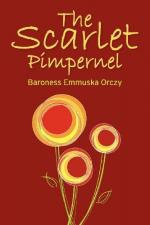It was close upon a couple of leagues to Paris, but that run was one of the happiest which Etienne had ever made. And he did it bare-footed, too, feeling neither fatigue nor soreness, despite the hardness of the road after a two weeks’ drought, which had turned mud into hard cakes and ruts into fissures which tore the lad’s feet till they bled.
He did not reach the Cabaret de la Liberte till nightfall, and when he got there he hardly dared to enter. The filth, the squalor, the hoarse voices which rose from that cellar-like place below the level of the street, repelled the country-bred lad. Were it not for the desperate urgency of his errand he never would have dared to enter. As it was, the fumes of alcohol and steaming, dirty clothes nearly choked him, and he could scarce stammer the name of “citizen Rateau” when a gruff voice presently demanded his purpose.
He realised now how tired he was and how hungry. He had not thought to pause in order to consume the small provision of bread and cheese wherewith thoughtful Lucile had provided him. Now he was ready to faint when a loud guffaw, which echoed from one end of the horrible place to the other, greeted his timid request.
“Citizen Rateau!” the same gruff voice called out hilariously. “Why, there he is! Here, citizen! there’s a blooming aristo to see you.”
Etienne turned his weary eyes to the corner which was being indicated to him. There he saw a huge creature sprawling across a bench, with long, powerful limbs stretched out before him. Citizen Rateau was clothed, rather than dressed, in a soiled shirt, ragged breeches and tattered stockings, with shoes down at heel and faded crimson cap. His face looked congested and sunken about the eyes; he appeared to be asleep, for stertorous breathing came at intervals from between his parted lips, whilst every now and then a racking cough seemed to tear at his broad chest.
Etienne gave him one look, shuddering with horror, despite himself, at the aspect of this bloated wretch from whom salvation was to come. The whole place seemed to him hideous and loathsome in the extreme. What it all meant he could not understand; all that he knew was that this seemed like another hideous trap into which he and Lucile had fallen, and that he must fly from it—fly at all costs, before he betrayed M. le Marquis still further to these drink-sodden brutes. Another moment, and he feared that he might faint. The din of a bibulous song rang in his ears, the reek of alcohol turned him giddy and sick. He had only just enough strength to turn and totter back into the open. There his senses reeled, the lights in the houses opposite began to dance wildly before his eyes, after which he remembered nothing more.
IV
There is nothing now in the whole countryside quite so desolate and forlorn as the chateau of Montorgueil, with its once magnificent park, now overgrown with weeds, its encircling walls broken down, its terraces devastated, and its stately gates rusty and torn.




